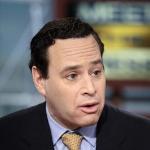So What Happened?
 UPDATED: Many friends and well-wishers, and some in the media, have asked for an account of my termination at AEI. Here it is.
UPDATED: Many friends and well-wishers, and some in the media, have asked for an account of my termination at AEI. Here it is.
After my dismissal from AEI Thursday, I posted in this space my letter of resignation. I declined television interviews, but I did speak to print journalists about the basic facts, in a way that expressed respect for AEI and its leadership.
I spent most of today flying from Washington to San Francisco and emerged from the plane to a fierce counter-attack, including an especially unpleasant piece from Charles Murray.
Let me respond here to some specific issues in this matter.
1) Was the firing political? Obviously I cannot enter into people’s minds, and at my termination lunch AEI President Arthur Brooks insisted that politics had nothing to do with the decision. So let’s just follow the time line. Waterloo piece is posted Sunday March 22. Wall Street Journal editorial denouncing me appears March 23. Summons to lunch arrives mid-morning of March 23. At lunch I am told that AEI wishes to terminate my salary, office, benefits, and research assistance. I am however at liberty to continue to consider myself part of the AEI family. I declined that offer and wrote a letter of resignation.
2) Was the firing in response to donor pressure? At lunch, Arthur Brooks explained that AEI was facing a new kind of donor environment, in which donors were becoming much more specific about where they wanted their money to go. Arthur expressed extreme personal distress at having to terminate me. It’s possible that those words were pro forma, and that my own affection for Arthur led me to attach more weight to them than I should have. It’s very strange that Charles Murray would denounce me as a liar because I wished to think better of my former boss!
3) Did AEI muzzle healthcare scholars? I fear that in reproducing in print a private conversation from some months ago, Bruce Bartlett made a transmission error. I did not report as fact that scholars were laboring under any restrictions. What I did say was that AEI was punching way below its weight in the healthcare debate. I wondered, not alleged, wondered, whether AEI scholars were constrained by fear of saying something that might get them into trouble. To repeat: this was something I asked many months ago in private conversation, not something I allege today in public debate.
4) Was I terminated for under-productivity? If you’ll believe that, you’ll believe anything. In seven years at AEI, I wrote 3 books, over 1000 newspaper and magazine articles, millions of words of web journalism. I have made more TV appearances, delivered more lectures than I even know how to count. (I’ll be delivering half dozen such lectures in China in the month of April as a guest of the US Department of State.)
I have written speeches on an unpaid basis for politicians I admire. I worked pro bono on a presidential nomination campaign. Then, there was the campaign to oppose Harriet Miers nomination. Does AEI seriously suggest that it fired the man who led the battle that made possible Samuel Alito’s confirmation to the Supreme Court because I didn’t pick up my snail mail often enough? That’s what they said to Politico.
As for Charles’ other suggestions, well, they point in a very different direction than he’d like. I did attend for example the 2009 World Forum, and was fiercely scolded by Lynne Cheney for my criticisms of Rush Limbaugh. This year I was not invited at all, despite having obtained for the conference some of its most distinguished international guests.
Charles acknowledges that he himself spends almost zero time on the AEI premises. If that’s a firing offense, I’ll see him at the soup kitchen.
UPDATE:
Finally, one last thought about my reply to AEI's claims above. If it's required that AEI scholars publish their online work at AEI's own blog, why did Charles Murray post his remarks about on me on the Corner, instead of upon ... AEI's own blog?